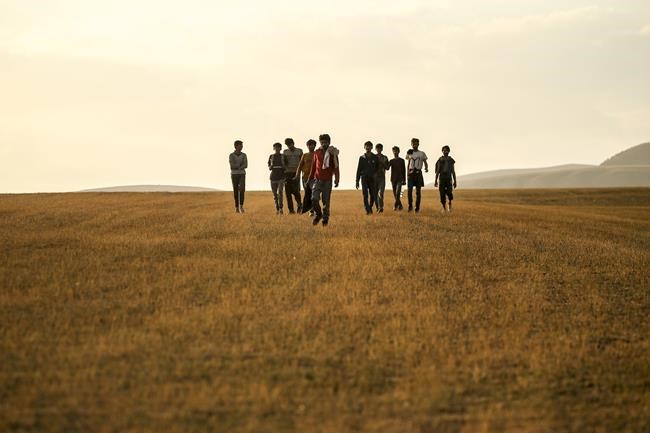Fearing Afghan refugee influx, Turkey reinforces border
Advertisement
Read this article for free:
or
Already have an account? Log in here »
To continue reading, please subscribe:
Monthly Digital Subscription
$0 for the first 4 weeks*
- Enjoy unlimited reading on winnipegfreepress.com
- Read the E-Edition, our digital replica newspaper
- Access News Break, our award-winning app
- Play interactive puzzles
*No charge for 4 weeks then price increases to the regular rate of $19.00 plus GST every four weeks. Offer available to new and qualified returning subscribers only. Cancel any time.
Monthly Digital Subscription
$4.75/week*
- Enjoy unlimited reading on winnipegfreepress.com
- Read the E-Edition, our digital replica newspaper
- Access News Break, our award-winning app
- Play interactive puzzles
*Billed as $19 plus GST every four weeks. Cancel any time.
To continue reading, please subscribe:
Add Free Press access to your Brandon Sun subscription for only an additional
$1 for the first 4 weeks*
*Your next subscription payment will increase by $1.00 and you will be charged $16.99 plus GST for four weeks. After four weeks, your payment will increase to $23.99 plus GST every four weeks.
Read unlimited articles for free today:
or
Already have an account? Log in here »
Hey there, time traveller!
This article was published 18/08/2021 (1577 days ago), so information in it may no longer be current.
TATVAN, Turkey (AP) — Fearing a new refugee crisis, Turkey is sending soldiers to reinforce its border with Iran in order to stop a potential influx of Afghans fleeing the Taliban insurgency.
Irregular arrivals are already up as Afghans who fled weeks and months ago show up at Turkey’s rugged border area after a long trek across Iran. A group of Afghans encountered by The Associated Press near the border said they had deserted the Afghan military and fled the country as the Taliban offensive accelerated.
“We came out of necessity. The Taliban have attacked our country and now they control it, we hope that the Turkish government (accept us),” one of them, Feroz Seddiqi, told the AP. He explained that they had scaled a mountain to reach Turkey, enduring thirst and hunger.

Nesar Ahmad, another member of the group, said they also experienced looting by thieves who took away their money and mobile phones.
Turkish President Recep Tayyip Erdogan’s government had brushed off warnings and criticism from opposition parties about an increase in the number of migrants from Afghanistan. This week, he admitted that Turkey faces a new refugee wave from Afghanistan and said his government would work with Pakistan to try and bring stability in the war-ravage country. Defense Minister Hulusi Akar said the border with Iran is being reinforced with troops and that a wall being erected at the border is nearing completion.
Turkey is already home to some 4 million migrants — most of them Syrians refugees who fled the civil war in the neighboring country. Anti-migration sentiment is already running high in the country as it grapples with economic woes – including high unemployment – that have been exacerbated by the coronavirus pandemic.
Video images circulating on social media over the past months have shown groups of young men allegedly arriving in Turkey from Iran. Some media reported that up to 1,000 migrants have been crossing the border with Iran every day.
Opposition parties have been calling on the government to “take control of the borders” and prevent a new migration surge.
They have also warned against any new migration agreement between Turkey and Western nations like the one Ankara reached with the EU in 2016. Under that deal, Ankara agreed to prevent the flow of migrants to Europe while the EU for its part promised, among other things, to send billions of Euros to Turkey for the Syrian refugees.
The main opposition party has also claimed that Erdogan struck a secret deal with U.S. President Joe Biden under which Turkey would accept Afghans who had worked with U.S. forces. The U.S. Embassy released a statement on Wednesday saying the claims are “completely without foundation.”
Akar, who inspected the border with Iran on Sunday, said that some 62,000 people were prevented from crossing that frontier since the start of the year.
“We will intensify our efforts and reinforce the understanding that our borders are impassable,” he said.
Yeni Safak newspaper, which is close to the government, reported that a 155 kilometer- (96 mile) stretch of a planned 241 kilometer (150 mile) wall has already been erected at the border. Nearly 200 watch towers equipped with electro-optical surveillance have also been constructed, the paper said.
__
Associated Press writers Suzan Fraser in Ankara, Turkey and Tameem Akhgar and Robert Badendieck in Istanbul, contributed.


